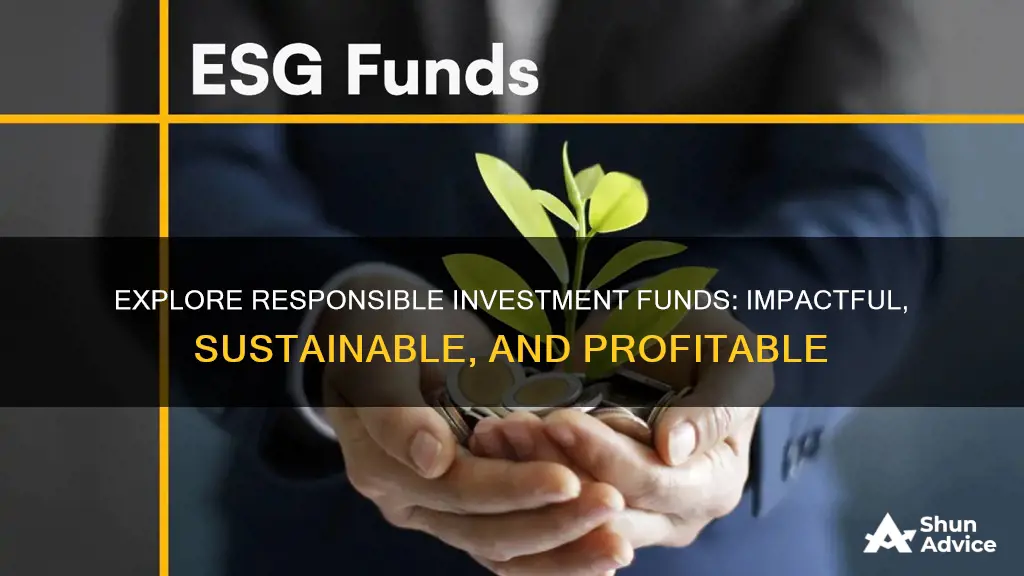
Socially responsible investment (SRI) funds are a type of investment that aims to generate positive returns for investors while prioritising environmental, social and governance considerations (ESG) in their decision-making. SRI funds only invest in companies that meet strict criteria, avoiding those whose products or practices fail to meet required standards.
SRI funds can be shaped by taking into account exclusion criteria when choosing assets, or by including businesses or governments that apply proactive social responsibility policies. SRI funds typically exclude industries that do not meet basic social responsibility criteria, such as tobacco and arms.
SRI funds seek to maximise medium and long-term returns, with the view that assets that meet certain ESG standards are likely to yield higher returns while reducing portfolio risk.
What You'll Learn
- Exclusion: Avoiding companies and sectors that fail to meet certain criteria
- Preference: Assessing each sector to find the best-in-class companies to invest in
- Engagement: Actively engaging with companies to promote socially responsible business practices
- ESG criteria: Environmental, social and governance factors
- Shareholder engagement: Influencing a company's decisions on ESG matters

Exclusion: Avoiding companies and sectors that fail to meet certain criteria
Exclusion is one of the three main approaches to responsible investment funds, with the other two being preference and engagement. This investment strategy actively avoids investing money in companies and sectors that fail to meet certain criteria or engage in certain activities. For example, an exclusionary approach would typically avoid investing in the manufacture of heavily scrutinised products like firearms, oil or tobacco.
Funds that take an exclusionary approach are referred to as having a 'dark green' responsible investment strategy. This is because they have strict exclusions in place, compared to funds that focus more on engagement, which are typically referred to as 'light green'.
Exclusionary funds will only invest in companies that meet a strict set of criteria. For example, some responsible funds will exclude producers and retailers of meat, poultry, fish and dairy, making them a good fit for vegan investors. Other funds will avoid any companies that engage in human rights abuses.
SRI funds will also typically exclude sectors that do not meet basic social responsibility criteria, such as the tobacco and arms industries. Another screening criterion is the level of accession to the UN Global Compact, the world's largest voluntary corporate citizenship initiative.
SRI funds are not only about excluding certain companies or sectors, but also about promoting positive social, environmental and economic (sustainable) value.
ETFs or Mutual Funds: Where Should Your Roth Go?
You may want to see also

Preference: Assessing each sector to find the best-in-class companies to invest in
Best-in-class ESG investment involves assessing and ranking companies based on environmental, social, and governance (ESG) criteria, then selecting the top-performing companies from each sector for investment. This approach aims to identify businesses that demonstrate strong ESG performance relative to their peers, recognising that different sectors may have varying weights assigned to specific criteria.
The process typically involves scoring companies on a range of ESG factors, such as:
- Environmental management
- Greenhouse gas emissions
- Energy efficiency
- Waste and recycling
- Social criteria, including occupational health and safety
- Diversity and inclusion in hiring and promotions
- Community welfare
Once the scores are assigned, a defined ranking hurdle is set, such as the top 30% or 50% of companies within each sector. The portfolio is then constructed by selecting companies that meet both the ESG screen and a financial screen, with analysts and portfolio managers working together to make these decisions.
This method allows investors to identify and invest in businesses that are leading the way in ESG performance within their respective sectors. It provides a more nuanced approach than simply screening out "bad" industries, as it recognises that every sector has the potential to improve its ESG practices.
However, one drawback of this approach is that the resulting portfolios may not differ significantly from traditional investment portfolios. To address this, some investors are exploring the creation of passive or near-passive portfolios based on custom-designed ESG indexes, which may offer a more cost-effective alternative.
Overall, best-in-class ESG investment provides a strategy for investors who want to support and encourage strong ESG performance across all sectors of the economy, driving systemic change while also seeking competitive financial returns.
Money Market Funds: Best Investment Options
You may want to see also

Engagement: Actively engaging with companies to promote socially responsible business practices
Engagement is a critical aspect of responsible investment, where investors actively interact with companies to encourage socially responsible business practices. This can take the form of shareholder activism or company engagement, utilising ownership rights to influence management and promote positive change. The scale of ownership and market power of the investor play a significant role in the efficacy of engagement. Large investors, often referred to as 'universal owners', can exert substantial influence by conveying their interests and leveraging the ultimate sanction of divestment if needed.
Shareholder engagement can be achieved through various means, including direct dialogue with corporate officers, submitting questions or proposals, attending shareholder meetings, filing proxy proposals, writing to management, and exercising voting rights. Proxy voting is a common method, where fund shareholders assign management to vote on their behalf. The introduction of the proposal by the U.S. Securities and Exchange Commission (SEC) in 2003, requiring mutual fund companies to disclose proxy voting policies and procedures to shareholders, is a testament to the impact of socially responsible investors.
Engagement also extends beyond the companies in which investors hold securities. It involves interacting with other stakeholders, such as policymakers and standard setters, to drive broader systemic change. This can include engaging with governments, financial regulators, and industry bodies to advocate for sustainable and responsible practices.
Additionally, collaboration plays a vital role in enhancing the effectiveness of engagement activities. Investors can collaborate informally by sharing insights and best practices or formally by joining initiatives where they engage with investees or other stakeholders. This collaborative approach allows for a more unified voice and greater impact in promoting socially responsible business practices.
Through active engagement, investors can influence companies to adopt more sustainable and ethical practices, improve their environmental, social, and governance (ESG) performance, and contribute to positive societal change. By integrating these engagement practices, investors can promote socially responsible business practices and align their investments with their values and broader social objectives.
A Beginner's Guide to Mutual Fund Investing in India
You may want to see also

ESG criteria: Environmental, social and governance factors
Environmental, social and governance (ESG) criteria are used to assess a company's business practices and performance on sustainability and ethical issues. This framework is used by investors to evaluate companies and determine their investment plans, a practice known as ESG investing.
Environmental Factors
Environmental factors involve an organisation's overall effect on the environment and the potential risks and opportunities it faces due to environmental issues. These include:
- Energy consumption and efficiency
- Carbon footprint and greenhouse gas emissions
- Air and water pollution
- Natural resource depletion
Social Factors
Social factors address how a company treats different groups of people, including employees, suppliers, customers and community members. Examples include:
- Fair pay for employees, including a living wage
- Diversity, equity and inclusion programmes
- Employee experience and engagement
- Workplace health and safety
- Data protection and privacy policies
- Fair treatment of customers and suppliers
- Community relations
- Funding of projects or institutions that help poor and underserved communities
- Support for human rights and labour standards
Governance Factors
Governance factors examine how a company polices itself, focusing on internal controls and practices to maintain compliance with regulations, industry best practices and corporate policies. Examples include:
- Company leadership and management
- Board composition, including its diversity and structure
- Executive compensation policies
- Financial transparency and business integrity
- Regulatory compliance and risk management initiatives
- Ethical business practices
- Rules on corruption, bribery, conflicts of interest, and political donations and lobbying
- Whistleblower programmes
A Beginner's Guide to Mutual Funds via Investopedia
You may want to see also

Shareholder engagement: Influencing a company's decisions on ESG matters
Shareholder engagement is a critical component of corporate governance and transparency, allowing shareholders to influence corporate policies, practices, and strategies. It involves actively involving investors in shaping a company's strategic decisions, policies, and practices. In the context of ESG investing, shareholder engagement is a powerful tool to encourage companies to improve their ESG performance and disclosure.
Shareholder engagement can take various forms, including proxy voting, dialogues with company management, and filing shareholder resolutions. Proxy voting allows shareholders to exercise their voting rights to support or oppose resolutions related to ESG issues, holding companies accountable for their actions. Constructive dialogues with company executives enable shareholders to express their concerns, suggest improvements, and gain insights into the company's ESG efforts. Shareholder resolutions proposed by investors can address specific ESG concerns and spur action from companies.
The positive outcomes of shareholder engagement in ESG investing include improved ESG performance, risk mitigation, enhanced transparency, stakeholder alignment, and market leadership. Companies that engage with shareholders on ESG matters tend to enhance their ESG practices and reporting, leading to improved long-term sustainability. By identifying and addressing ESG risks proactively, companies can protect shareholder value and avoid legal and reputational issues. Shareholder engagement encourages companies to disclose more information about their ESG efforts, enabling investors to make more informed decisions.
Additionally, engaging with shareholders fosters alignment between a company's values and those of its investors, resulting in a stronger corporate culture. Companies that excel in ESG performance gain a competitive advantage in attracting ESG-focused investors and customers.
However, shareholder engagement in ESG investing also faces challenges. Some companies may resist change, and not all shareholders are equally committed to ESG goals. Measuring the direct impact of shareholder engagement on ESG outcomes can be difficult, making it hard to quantify the value of these efforts.
To address these challenges, companies should foster a culture of transparency and proactive stakeholder engagement. By identifying and addressing ESG risks early on, companies can mitigate potential negative impacts on their operations and stakeholders. Additionally, integrating stakeholder feedback into decision-making processes ensures that the interests and concerns of all parties are considered.
Overall, shareholder engagement is a powerful tool for driving positive change and improving ESG performance. It enables investors to influence corporate behaviour and contribute to a more sustainable and responsible business environment.
Understanding Investment Fund Managers: Their Role and Importance
You may want to see also
Frequently asked questions
A responsible investment fund is a fund that aims to generate positive returns for investors while prioritising environmental, social and governance (ESG) considerations in its investment decisions.
There are three main approaches to responsible investment: Exclusion, Preference, and Engagement. Exclusion means actively avoiding investing in companies or sectors that fail to meet certain criteria. Preference means assessing each sector and investing in the best-in-class companies within them. Engagement involves actively engaging with companies to promote socially responsible business practices.
Examples of responsible investment funds include PensionBee's Impact Plan and Shariah Plan, and BBVA's BBVA Sustainable Future and BBVA Sustainable Development funds.
First, decide whether you want to build your portfolio yourself or get help from a robo-advisor. Then, open an investing account and outline your values and priorities. Finally, research potential investments carefully, considering both your financial goals and your values.







